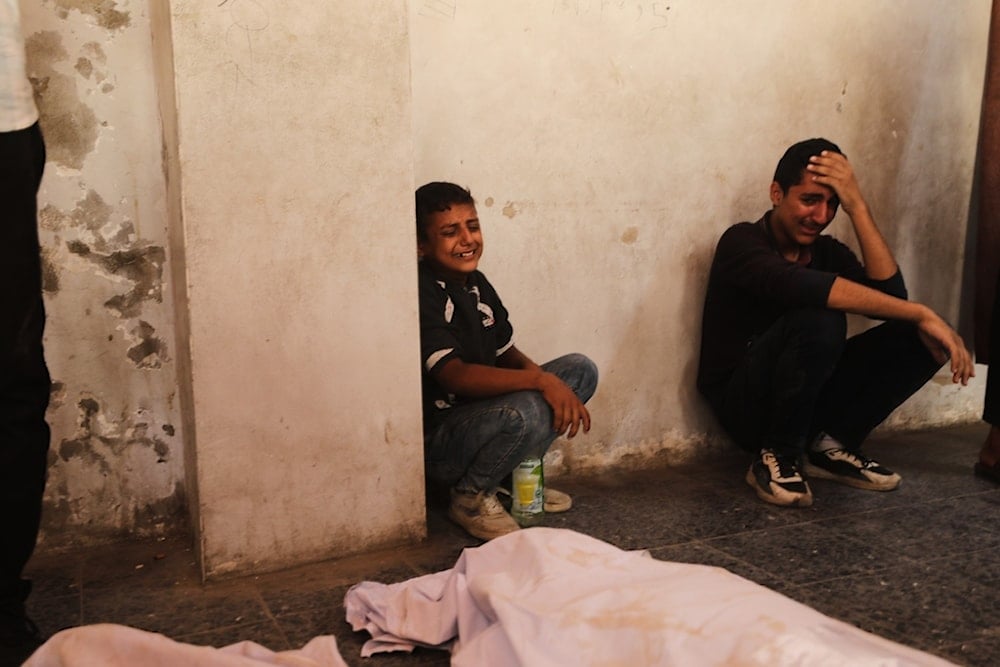Gaza officials report 47 Israeli breaches of ceasefire since Monday
Israeli forces are shattering the Gaza ceasefire with 47 documented violations that left dozens dead and hundreds injured, reigniting violence just days after the truce was signed.
-

Mourners react next to bodies of Palestinians, killed by Israeli fire after crossing the ceasefire line according to the Hamas-run Civil Defense, as they brought to Al Ahli Hospital in Gaza City, Saturday, Oct. 18, 2025. (AP Photo/Yousef Al Zanoun)
Authorities in the Gaza Strip say that Israeli forces have repeatedly breached the newly declared ceasefire, committing 47 violations since the agreement was announced earlier this week.
"Since the announcement of the cessation of hostilities in the Gaza Strip, the Israeli occupation force has committed a series of violations, the number of which to date has reached 47 … Due to the ongoing violations by the Israeli occupation, 38 people have been killed and 143 others have sustained injuries of varying severity," the authorities said in an official statement on Saturday.
The report states that Israeli attacks have persisted despite an internationally brokered deal aimed at halting the months-long genocide. The latest figures point to a growing civilian toll, with dozens of Palestinians killed and more than a hundred wounded since the truce took effect.
The ceasefire agreement, signed on Monday by US President Donald Trump, Egyptian President Abdel Fattah el-Sisi, Qatari Emir Tamim bin Hamad Al Thani, and Turkish President Recep Tayyip Erdoğan, was intended to establish a comprehensive cessation of hostilities and pave the way for humanitarian relief operations in the besieged enclave.
Renewed violations and political fallout
The ceasefire was first announced by Hamas on October 9, following mediation by Egypt, Qatar, and Turkey, with the group stating that all of its non-negotiables, including a full end to the war, the withdrawal of Israeli occupation forces, the entry of humanitarian aid, and a prisoner exchange, had been met. Hamas hailed the deal as a step toward securing Palestinian rights, urging the United States to ensure "Israel's" compliance.
However, by October 14, Israeli occupation forces had resumed drone strikes across the Gaza Strip, killing at least seven Palestinians and wounding several others. The attacks targeted residential areas in Gaza City, Jabalia al-Balad, and Khan Younis, reigniting tensions and undermining hopes for stability.
Hamas spokesperson Hazem Qassem later denounced the Israeli assaults as "a deliberate breach" of the ceasefire, adding that while the movement's al-Qassam Brigades had adhered to the terms, including the handover of Israeli soldiers' bodies, "Israel" continued to target civilians in al-Shujaiya and Rafah.
US position and aid restrictions
US President Donald Trump said in remarks to CNN on Wednesday that he would consider authorizing "Israel" to resume full-scale military operations if Hamas fails to meet its obligations. "Israel will be back on those streets at my word," Trump said, adding that Gaza's calm "depends entirely on Hamas fulfilling its obligations under the deal."
Human rights organizations, however, reported 36 Israeli ceasefire violations within the first five days of the truce, contradicting claims that "Israel" was observing the agreement.
Meanwhile, Gaza's Rafah Crossing remains closed, blocking the entry of critical supplies despite assurances that aid would begin flowing through. The Palestinian Authority has expressed readiness to assume administrative control of the crossing, signaling a potential shift in governance amid mounting humanitarian pressure.
Gaza buried under ruins
As violations mount, Gaza's civil defense authorities warn of an escalating humanitarian and environmental catastrophe. Government estimates place the total volume of rubble at up to 70 million tons, with around 20,000 unexploded bombs and missiles scattered across the Strip. The destruction, a result of two years of continuous Israeli bombardment, has rendered aid delivery and recovery operations nearly impossible.
In Khan Younis, officials report that 85% of the city has been destroyed, with hundreds of thousands of tons of debris and waste blocking vital infrastructure. Municipalities say their limited teams lack the fuel, machinery, and safety equipment needed to clear the devastation.
Health authorities confirmed on Thursday that 29 Palestinians were killed in 24 hours due to ongoing Israeli attacks, bringing the total number of martyrs since the start of the war in October 2023 to 67,967, with over 170,000 wounded.
The renewed violence and the scale of destruction have cast serious doubt on the viability of the ceasefire agreement and on the international community's ability, or willingness, to enforce it.
Read more: Tehran warns world to be wary of repeated Israeli ceasefire breaches

 4 Min Read
4 Min Read









